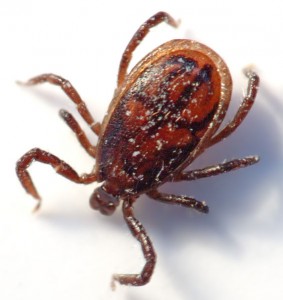Disclaimer: The following are general guidelines to follow and do not constitute medical advice
Ticks like to “hang out” in low lying shrubs, bushes or plants waiting for animals to come by to supply them with the blood meal that will help them complete their life cycle. Ticks then climb on the animal or human and attach themselves to obtain the blood from their victims. In the process they inject saliva and suck blood from the host, much like mosquitoes.
In general, most tick bites do not transmit disease. More commonly they are associated with infection around the site of the bite, local irritation, allergic reaction, or the cause of retained mouth parts when the tick is removed. The sooner you can remove the tick, the less likely they are to transmit diseases, so get them off quickly!
How to remove a tick
Most of the time, a pair of tweezers and slow, gentle, upward pressure will get rid of the tick. Burning the tick off may not work and may cause a burn to the patient. For a nice diagram and instructions please see the CDC website about how to remove a tick:
http://www.cdc.gov/ticks/removing_a_tick.html
If there are retained parts, please see your doctor so they can recommend options for getting the head out or letting it come out on its own.
Tick Borne Diseases
There are some serious diseases associated with tick bites. Usually they are associated with fever, feeling ill, and a rash. A few of the more common illnesses are: Rocky Mountain Spotted Fever, Lyme Disease, Erlichiosis, and Tularemia. Please contact your doctor immediately if you develop a rash, fever, or are feeling sick after a tick bite.
To avoid ticks, know where to expect them and use a bug repellant. Ticks live in areas that are grassy or near woods. They are often found in bushes and shrubs and can become a big problem when grass is too high. A bug repellant, such as DEET, can protect you for several hours.
If you find ticks on you, someone in your household, or a household pet, call Northwest Exterminating to speak to someone about a way to get rid of ticks.
Thanks,
Dr. Goo


